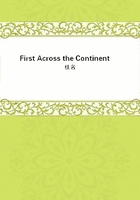
第5章
In those days communication between frontier posts and points lying far to the eastward of the Mississippi was very difficult; it required six weeks to carry the mails between New York, Philadelphia, and Washington to St. Louis; and this was the reason why a treaty, ratified in July, was not officially heard of in St. Louis as late as December of that year.
The explorers, shut out of Spanish territory, recrossed the Mississippi and wintered at the mouth of Wood River, just above St. Louis, on the eastern side of the great river, in United States territory.
As a matter of record, it may be said here that the actual transfer of the lower part of the territory--commonly known as Orleans--took place at New Orleans, December 20, 1803, and the transfer of the upper part was effected at St. Louis, March 10, 1804, before the Lewis and Clark expedition had started on its long journey to the northwestward.
All over the small area of the United States then existed a deep interest in the proposed explorations of the course and sources of the Missouri River. The explorers were about to plunge into vast solitudes of which white people knew less than we know now about the North Polar country.
Wild and extravagant stories of what was to be seen in those trackless regions were circulated in the States. For example, it was said that Lewis and Clark expected to find the mammoth of prehistoric times still living and wandering in the Upper Missouri region; and it was commonly reported that somewhere, a thousand miles or so up the river, was a solid mountain of rock salt, eighty miles long and forty-five miles wide, destitute of vegetation and glittering in the sun! These, and other tales like these, were said to be believed and doted upon by the great Jefferson himself.
The Federalists, or "Feds," as they were called, who hated Jefferson, pretended to believe that he had invented some of these foolish yarns, hoping thereby to make his Louisiana purchase more popular in the Republic.
In his last letter to Captain Lewis, which was to reach the explorers before they started, Jefferson said: "The acquisition of the country through which you are to pass has inspired the country generally with a great deal of interest in your enterprise.
The inquiries are perpetual as to your progress. The Feds alone still treat it as a philosophism, and would rejoice at its failure.
Their bitterness increases with the diminution of their numbers and despair of a resurrection. I hope you will take care of yourself, and be a living witness of their malice and folly."
Indeed, after the explorers were lost sight of in the wilderness which they were to traverse, many people in the States declaimed bitterly against the folly that had sent these unfortunate men to perish miserably in the fathomless depths of the continent.
They no longer treated it "as a philosophism," or wild prank, but as a wicked scheme to risk life and property in a search for the mysteries of the unknown and unknowable.
As a striking illustration of this uncertainty of the outcome of the expedition, which exercised even the mind of Jefferson, it may be said that in his instructions to Captain Lewis he said:
"Our Consuls, Thomas Hewes, at Batavia in Java, William Buchanan in the isles of France and Bourbon, and John Elmslie at the Cape of Good Hope, will be able to supply your necessities by drafts on us."
All this seems strange enough to the young reader of the present day; but this was said and done one hundred years ago.